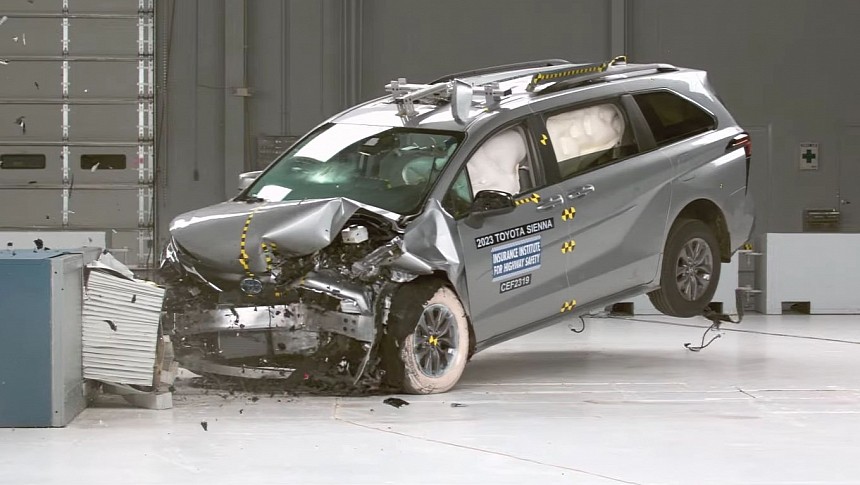Minivans are family-oriented vehicles with three-row seating. Although Chrysler and Renault pioneered the modern-style minivan in 1984 with the introduction of the Dodge Caravan and Espace, this kind of vehicle couldn't offer less rear passenger protection in the moderate overlap front crash test.
What's that? Described as the lynchpin of the Insurance Institute for Highway Safety's crash test program, the moderate overlap front evaluation requires a vehicle to be crashed into a barrier at 40 mph (make that 63 kph). The dummy in the driver seat is the size of an average male adult, whereas the dummy in the second-row seat behind the driver is the size of a 12-year-old child or a small woman.
Also referred to as moderate overlap 2.0, the updated moderate overlap front crash test utilizes new metrics that focus on the rear-seat occupant's injuries. The nonprofit organization has recently tested four minivans produced for the 2023 model year, with all four being deemed acceptable or poor in terms of rear passenger restraints and kinematics. The poor rating was awarded to the Sienna, which is the only minivan of the bunch to feature a rear seatbelt reminder.
How can some of the world's biggest automakers design minivans without paying utmost attention to rear passenger protection? That's a question we currently don't have an answer for, but then again, remember that said automakers aren't required to make said vehicles as safe as technically possible.
The IIHS is a completely different entity from the NHTSA, the latter being tasked with enforcing motor vehicle safety standards and fuel economy standards. The federal watchdog is notorious for being too big of a softie on certain topics of interest, which is why nonprofit organizations such as the Insurance Institute for Highway Safety were established.
As for the overall ratings in the updated moderate overlap front crash test, we're dealing with marginal and poor minivans. The Odyssey was deemed poor due to high forces on the head and neck of the rear passenger dummy. What's more, the seatbelt allowed the dummy's head to come extremely close to the front seatback, thus increasing the risk of injury.
Jessica Jermakian, the vice prez of vehicle research at the Insurance Institute for Highway Safety, believes that all four automakers need to improve the restraint systems of their minivans. Either because of poor belt positioning or excessive belt forces, the rear occupant is subjected to life-threatening injuries.
The V6-powered Odyssey is available to configure at $37,840 (excluding the destination freight charge) for model year 2024. Toyota wants $37,185 at the very least for the hybrid-only Sienna, whereas Chrysler advertises the Pacifica at $38,425 for model year 2024. Last but certainly not least, the Sedona-replacing Kia Carnival is available at a reasonable $33,200.
Also referred to as moderate overlap 2.0, the updated moderate overlap front crash test utilizes new metrics that focus on the rear-seat occupant's injuries. The nonprofit organization has recently tested four minivans produced for the 2023 model year, with all four being deemed acceptable or poor in terms of rear passenger restraints and kinematics. The poor rating was awarded to the Sienna, which is the only minivan of the bunch to feature a rear seatbelt reminder.
How can some of the world's biggest automakers design minivans without paying utmost attention to rear passenger protection? That's a question we currently don't have an answer for, but then again, remember that said automakers aren't required to make said vehicles as safe as technically possible.
The IIHS is a completely different entity from the NHTSA, the latter being tasked with enforcing motor vehicle safety standards and fuel economy standards. The federal watchdog is notorious for being too big of a softie on certain topics of interest, which is why nonprofit organizations such as the Insurance Institute for Highway Safety were established.
As for the overall ratings in the updated moderate overlap front crash test, we're dealing with marginal and poor minivans. The Odyssey was deemed poor due to high forces on the head and neck of the rear passenger dummy. What's more, the seatbelt allowed the dummy's head to come extremely close to the front seatback, thus increasing the risk of injury.
Jessica Jermakian, the vice prez of vehicle research at the Insurance Institute for Highway Safety, believes that all four automakers need to improve the restraint systems of their minivans. Either because of poor belt positioning or excessive belt forces, the rear occupant is subjected to life-threatening injuries.
The V6-powered Odyssey is available to configure at $37,840 (excluding the destination freight charge) for model year 2024. Toyota wants $37,185 at the very least for the hybrid-only Sienna, whereas Chrysler advertises the Pacifica at $38,425 for model year 2024. Last but certainly not least, the Sedona-replacing Kia Carnival is available at a reasonable $33,200.



















